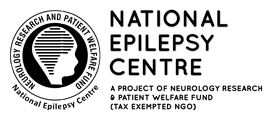Psychogenic non-epileptic seizure (PNES)
PNES is a condition in which people clinically may have symptoms somewhat similar to an epileptic seizure but diagnostically there is no unusual electrical activity in the brain. These events are suggestive of complex physical reactions to significant psychological stresses. It can occur at any age. About 25% of patients referred to the epilepsy centre for uncontrolled seizures are diagnosed with PNES after diagnostic tests and ruling out conditions like heart disease, stroke, fainting and neuromuscular disorders. Psychological or psychiatric assessment helps diagnose PNES. For treatment of PNES, the person should be referred to a specialist for psychological therapy and/or medications.
Fainting attacks
Fainting happens when one loses consciousness for a short amount of time because the brain isn’t getting enough oxygen. Fainting or syncope, is commonly described as an episode of ‘passing out’. A fainting spell generally lasts from a few seconds to a few minutes. Oxygen deprivation to the brain can be due to multiple causes including low blood pressure. Fainting is not usually serious.
Migraine
Migraine is a neurological condition that can present with multiple symptoms. It is frequently characterized by intense, debilitating headaches. Symptoms may include nausea, vomiting, mind fog, difficulty in speaking, numbness or tingling, lethargy and sensitivity to light and sound. Migraines often run in families and affect all ages. Migraine triggers can be physical, emotional and dietary. One must identify and avoid their triggers and evade precipitation of an attack.
Tantrum/Temper Attacks
A tantrum attack, temper tantrum is an emotional outburst, typically characterized by stubbornness, crying, screaming, violence, defiance, angry ranting, a resistance to pacification, and in some cases, physically violent behavior. Physical control may be lost; the person may be unable to remain still; and even if the goal of the person is met, they may not be calmed.
Breath-holding Attacks
Breath-holding attacks are brief spells when young child stops breathing for up to one minute. These spells often cause a child to lose consciousness. Breath-holding spells usually occur when a young child is angry, frustrated, in pain, or afraid.There are two types of breath-holding spells; cyanotic caused by a change in the child’s usual breathing pattern, usually in response to feeling angry or frustrated. It’s the most common type. Pallid attacks are caused by slowing of the child’s heart rate, usually in response to pain and fear. Some children may have both types of spells at one time or another. With time, they go away on their own.
Panic attacks
A panic attack is a sudden intense wave of fear characterized by its unexpectedness and incapacitating, immobilizing intensity. Palpitations, sweating, shaking, shortness of breath, numbness, a feeling that something bad is going to happen occur. One may feel like they are dying. Panic attacks often strike out of the blue, without any warning, and sometimes with no clear trigger. They may even occur in a relaxed state or when asleep.
Conditions causing Metabolic Imbalance
Seizures can result due to metabolic disturbance such as low blood sugar levels, low or high sodium and potassium levels, low calcium levels and others.
